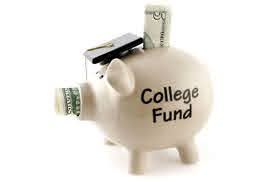Qualified distributions are used to pay for education expenses at eligible schools and institutions.
If withdrawals are used for purposes other than qualified education expenses, the earnings will be subject to a 10% federal tax penalty in addition to federal and, if applicable, state income tax. States take different approaches to the income tax treatment of withdrawals.
Higher education
Education expenses can include:
- Tuition and mandatory fees
- Required books, supplies and equipment
- If used primarily by the beneficiary while enrolled at an eligible higher educational institution:
- Computers or peripheral equipment (such as printers)
- Computer software
- Internet access and related services
- Room and board during any academic period during which the beneficiary is enrolled at least half-time in a degree, certificate or other program that leads to a recognized educational credential awarded by an eligible educational institution
- For students who live off campus, withdrawals may be used to pay up to the amount determined by the school for the room and board allowance for students who live off campus in its Cost of Attendance for the academic term.
- Services for a beneficiary with special needs
- Amounts paid as principal or interest (up to $10,000 lifetime maximum) on any qualified student loans of a designated beneficiary or their sibling for distributions made after December 31, 2018.
Tips: Participants can use their CollegeAmerica account for undergraduate and graduate school as well as specialized programs, such as medical or law school.
Kindergarten through 12th grade
Education expenses can include tuition for an elementary or secondary private school or religious school, up to a maximum of $10,000 incurred during the taxable year per beneficiary. Home school expenses are not considered a qualified education expense.
Note: Withdrawals for K–12 expenses may not be exempt from state tax in certain states. Please consult your tax advisor for state-specific details.
Apprenticeship programs
For distributions made after December 31, 2018, qualified expenses required for participation in an apprenticeship program registered and certified with the Secretary of Labor under Section 1 of the National Apprenticeship Act include:
- Fees
- Books
- Supplies
- Equipment
Nonqualified distributions
Nonqualified distributions are made to pay for ineligible expenses. When an account owner makes a nonqualified distribution:
- The principal (contribution amount) is not subject to taxes or penalties.
- The earnings are subject to a 10% federal tax penalty in addition to federal and, if applicable, state income tax.
Exceptions
Earnings on a distribution due to one of the following events are subject to federal income tax but not the 10% penalty:
- Death of the beneficiary
- Disability of the beneficiary
- Scholarship receipt (to the extent of the scholarship award)
Contact us today to schedule a free consultation and learn more about how you can set aside money for college!



